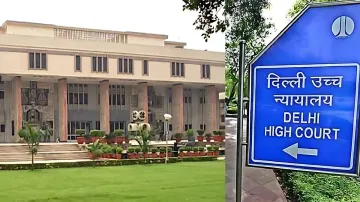The Delhi High Court on Wednesday noted that deepfake technology is going to be a serious menace in society and the government should start thinking about it and observed that the antidote for Artificial Intelligence (AI) would be technology only.
Two pleas filed in Delhi HC
The Delhi HC was hearing two pleas filed against non-regulation of deepfake technology. One plea was filed by Rajat Sharma, Chairman and Editor-in-Chief of Independent News Service Private Limited (INDIA TV), and the other plea was filed by Advocate Chaitanya Rohilla.
During the hearing of the matter, Rohilla's counsel told the court that the Centre in its response took a stand that the Information Technology Act and the Data Protection Act are sufficient to deal with deepfake technology.
The high court observed that before the elections, the government was agitated on the issue and now things have changed.
Additional Solicitor General Chetan Sharma, appearing for the Centre, told the top court that the body language might have changed but all are still agitated as much we were then.
Antidote for AI would be technology only: HC
To this, the top court bench replied that the antidote for AI would be technology only. “Any content/URL/websites on the Internet can only be blocked as per the established legal procedure,” it said.
It should be noted that deepfake technology facilitates the creation of realistic videos, audio recordings and images that can manipulate and mislead the viewers by superimposing the likeness of one person onto another.
Acting Chief Justice Manmohan and Justice Tushar Rao Gedela noted that. “You ( Central government) will have to start working on this. You also start thinking about this.”
Justice Manmohan stated that, “You also do some study. It is like what you are seeing and what you are hearing, you can’t believe it. That is something which shocks.”
Rajat Sharma seeks directions to block access to deepfake apps
The plea filed by Rajat Sharma sought directions to block public access to applications and software enabling the creation of such content. And the other plea was filed by Chaitanya Rohilla, a lawyer, against deepfakes and the unregulated use of artificial intelligence.
In the plea, Rajat Sharma further added that the proliferation of deepfake technology poses a significant threat to various aspects of society.
He added that there is a threat of potential use of this technology in fraud, identity theft and blackmail, harm to individual reputation, privacy and security.
In the plea, he further added that the Centre had made a statement of its intent to formulate regulation for dealing with deepfakes and synthetic content in November 2023, but no such action has been taken so far.
Rajat Sharma in his plea sought a direction to the Centre to identify and block public access to the applications, software, platforms and websites enabling the creation of deepfakes.
Latest India News
